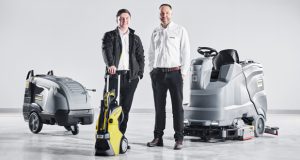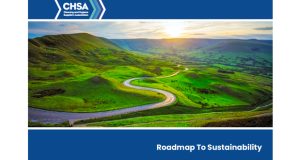 Industrial and commercial cleaning chemicals manufacturer Greyland has increased the amount of recycled polymer in its bottles, bringing the overall percentage of recycled material used, to an unprecedented 31per cent in the UK, up from ‘just’ 25 per cent in 2018/19.
Industrial and commercial cleaning chemicals manufacturer Greyland has increased the amount of recycled polymer in its bottles, bringing the overall percentage of recycled material used, to an unprecedented 31per cent in the UK, up from ‘just’ 25 per cent in 2018/19.
“We are proud to be the first UK cleaning chemicals manufacturer in our market sector taking such steps in eliminating harmful plastics from the environment, whilst significantly reducing our carbon footprint at the same time,” says Greyland MD Richard Dyson.
“Thanks to a unique and exclusive partnership with our UK based plastic bottle manufacturer, as much as 31 per cent of the plastic polymer within our containers is currently made with UK recycled material. Over the coming year we expect to increase this current 31 per cent higher still.”
Because of the current lack of UK recycled material available, Alpla are the only bottle manufacturer in the UK currently able to offer this recycled product to any chemical manufacturers within the UK janitorial and catering sector market place. The new supply arrangement is exclusive to Greyland for the industrial cleaning chemicals sector.
“Environmental concerns are raising expectations of distributors and end-users alike”, says Dyson, “and with 98 per cent of our products sold as either 750ml trigger sprays, 1 ltr angle neck toilet cleaner bottles, and 5 ltr jerry cans, it makes sense to commit to increasing degrees of sustainability by using as much UK recycled material where we can.
“By using so much less virgin plastic, and increasing the element of recycled material used, we at Greyland are helping to fulfil the global desire for less plastic in the environment.
“Some other UK plastic bottle manufacturers are currently importing recycled polymer from across the globe. Then their cleaning chemicals manufacturer clients are then marketing them as using up to 100 per cent recycled polymer within all their plastic bottles. Environmentally this claim is totally wrong because they have conveniently forgotten to reveal the full extent of their own company’s newly extended carbon footprint.
“Recycling plant investment and capacity in the UK and Europe is woefully short of where it should be”, Dyson declares.
“Although Alpla supplier Biffa has recently opened its new £27.5m state of the art PET plastic bottle recycling facility in Seaham, County Durham, investment from others is sadly lacking.”
The new Biffa facility can convert 57,000 tonnes of PET plastic per year, equivalent to 1.3 billion plastic bottles. PET, or polyethylene terephthalate, is a commonly used material, popular as it is lightweight, durable, and highly recyclable, producing significantly lower carbon emissions.
“Currently in the UK cleaning industry, when it comes to ‘proper’ closed loop recycling, Greyland has it as good as it can be. “
I would like to state right now”, adds Dyson, “that publicising our efforts in this way is actually a ‘cry for help’ for more to be done by others. Frankly, we would rather not be in this exclusive position, and we are not gloating because of it.
“New single use plastic taxes will be coming in shortly. But rather than tax, why not invest?
“How about government deal with the issue first, and get on with some urgent investment to help us all. Most plastic bottle manufacturers are doing their bit by reducing the weight of their containers by reducing the plastic content within them.
“If the thanks they then get for that is just paying more tax, which then doesn’t get reinvested in UK plastic recycling plants, where does that leave them, the cleaning chemical manufacturer, the distributor, and finally the end user?”
Now in its 22nd year, Greyland was founded with a firm belief in continuous reinvestment and innovation.
Greyland is ISO 9001 and 14001 compliant, long valued members of Green Business recycling network, CHSA, UK Cleaning Products Industry Association and British Safety Council.




